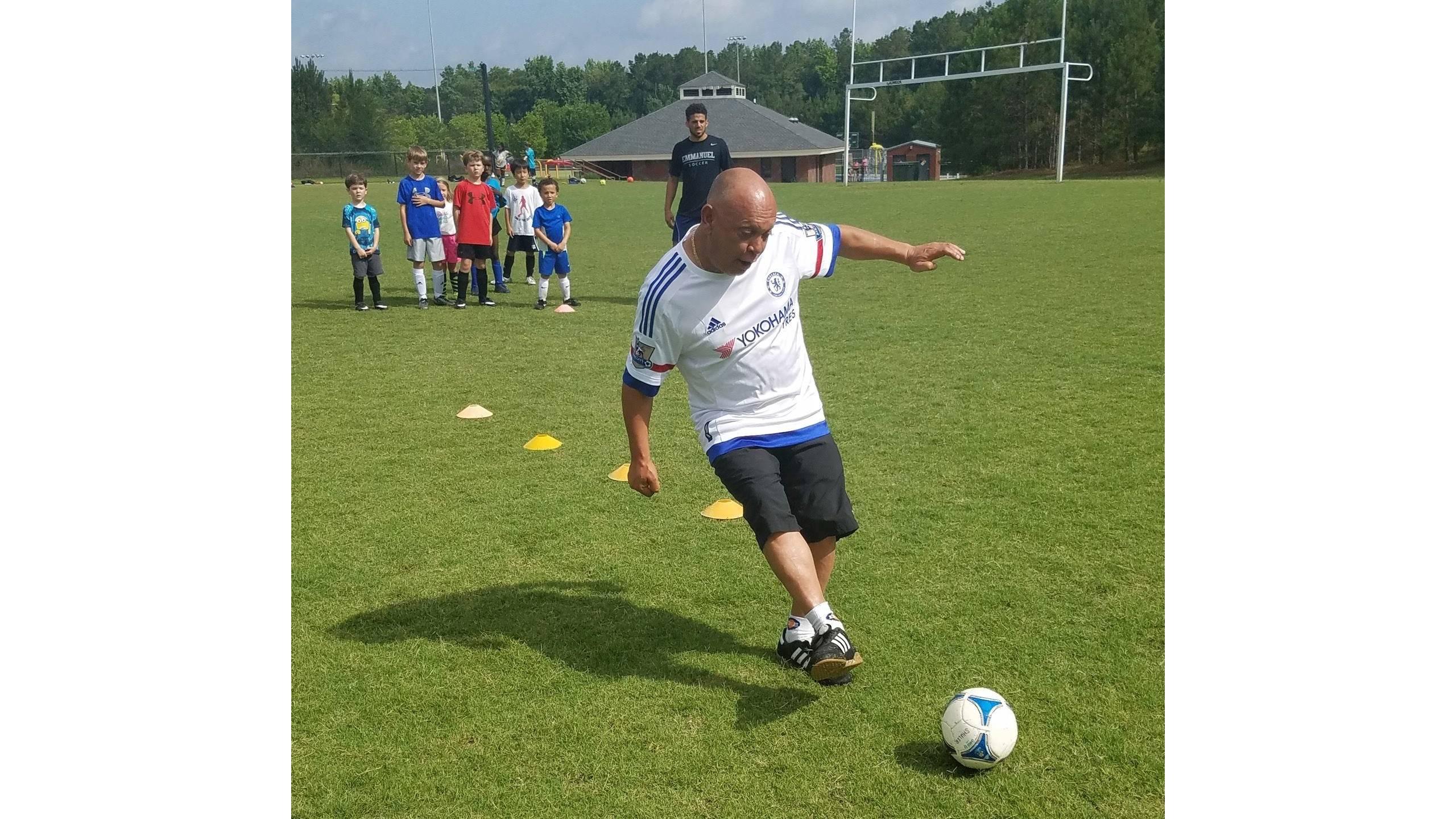In two years, Atlanta will be part of center stage for worldwide soccer. The city will host eight of the 2026 World Cup matches, including a semifinal match on July 15 at Mercedes-Benz Stadium.
It’s a safe bet that 62-year-old Lloyd White, chief executive officer at the Athens United Soccer Association (AUSA), a renowned competitive youth soccer program, will be among those cheering on a favorite World Cup team.
Soccer has been a way of life for White ever since it became a regular escape from some tough childhood days in his native London. Being on the soccer field as a young person, he said, “was my relief, my getting away from everything
From playing the game to coaching it, soccer has defined White’s days.
He’s been CEO at AUSA since 2010, but that’s just part of his journey in the world of soccer — known as football in most of the world outside the United States.
White’s professional career began when he was just 16 and included stints with the Queens Park Rangers Football Club (FC), Brighton Hove Albion FC, Millwall FC, and Association Football Club Wimbledon.
White came to the United States in 1988 to play in an international soccer tournament in metropolitan Atlanta and returned for the same tournament the following year. At the urging of other soccer professionals, White stayed in the United States to continue pursuing his love of the game.
White’s stateside soccer playing career included stints with the Atlanta Attack, Atlanta Magic, Academy Chiefs, Atlanta Lightning, Gwinnett County Steamers, Chattanooga Express and Atlanta Express.
Those teams were part of a bumpy resurgence of professional soccer in Atlanta. They appeared in the wake of the up-and-down history of the Atlanta Chiefs, the North American Soccer League team that played at Atlanta Stadium in the late 1960s and early 1970s, and the 2104 debut of Atlanta United FC, a popular Major League Soccer team.
He coached soccer for several youth organizations in the Atlanta area, and in the early 1990s, became one of the first paid soccer trainers in Georgia, offering his services through his own private business.
“I started a sort of revolution, I think,” he said. White’s work after his playing days included operating his own soccer training camps. His bedrock approach to those camps was something he called the “4 L’s,” for “Lloyd’s Look, Listen and Learn” philosophy.
During his time in metropolitan Atlanta, White was courted regularly by AUSA until joining the organization in 2010. Despite his abiding interest in soccer, White said it was something of a surprise to him that the game became a career path.
“I never really thought I would be in this,” he said, but “everyone else around me wanted me to stay in it.” He was inspired to enter coaching, he said, after noticing the large numbers of young people being attracted to the game.
“I thought, ‘Maybe I could help with that’,” White said.
While developing young people’s soccer skills has been a focus of White’s work, including his current role at AUSA, he also works to help players develop life skills.
“It’s … not just the soccer we do it for,” White said, explaining that one of his primary goals is “to make (young) people confident.” As part of that, White added, he works to instill discipline in his players for their lives beyond the soccer pitch. He also works to teach his players to respect other people, he said.
It’s gratifying, White continued, when he hears from former players who have benefited from his lessons for success off the soccer field. Among White’s most prized mementos from former players is a letter he received many years ago from one of his former youth team players.
The player, who went on to become a military officer and an airline pilot, wrote White to tell him, “I hope someday my son will learn from someone like you.”
“A lot of them get back in touch with me,” White said of the young players he’s coached through the years. “For them to remember those lessons …,” he continued, clearly in wonder, as his voice trailed off, that his lessons have stuck with his former players for years.
“I try to develop players to give them opportunities, but not just to play soccer,” White said. “I want them to be better than myself,” he continued. “I’m really excited for them all.”
One of the things that most excites White about his work at AUSA is the fact that the organization routinely sends players to college teams.
“We’ve put hundreds of kids in college,” he said. Anywhere between five and 10 AUSA players, both young men and young women, sign on with collegiate soccer programs, mostly across the southeastern United States.
Asked to address some of the challenges of coaching young people in soccer, White turned the question toward parents.
“Lots of people are trying to live through their kids, instead of allowing them just to enjoy the time” playing soccer, White said. He went on to urge parents simply to “enjoy what you’ve got going on” with a child playing soccer, “because it’s going to be over really quick.”
Soccer obviously hasn’t been “over really quick” for White, but he says his involvement in the game has helped him retain at least some of the vigor of his youth.
“I don’t feel any older at all,” White said, asserting that running around on the soccer pitch “has really helped me stay younger.”
As far as his consuming interest in youth player development is concerned, White is particularly excited that AUSA male and female teams will be competing for the first time this year in the United Soccer League (USL), the largest professional soccer league in North America. The USL announced in mid-February that AUSA teams will be competing in the pre-professional ranks of the league’s South Central Division.
As part of that move into pre-professional soccer, AUSA will be hiring two new coaches to grow the game in Athens. Those new coaches are clearly needed. There currently are nearly 1,000 young people in AUSA programs, up from 400 when White became CEO of the association nearly a decade earlier.
For White, the move up the USL ladder will be a great way for Athens United players to get noticed, potentially paving the way for collegiate and even professional careers in the game.
There’s also some potential for exciting news for the wider community in connection with USL soccer, White said, as the league continues to keep an eye on Athens.
“I really think (the next step with the USL) is going to be a professional team,” he said.
If – or as White believes, when — professional soccer comes to Athens, it will have a lot to do with that young boy in London who crossed the ocean years ago. Since then, White has both ridden and spurred a rising tide of the sport in the United States – work that continues for him today in Athens.
Jim Thompson is a freelance journalist living in Athens. He worked for more than 30 years as a newspaper reporter and editor at publications in Georgia and Florida before embarking on his freelance career.




